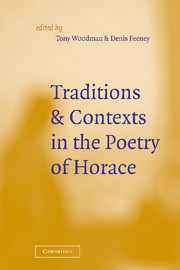Book contents
- Frontmatter
- Contents
- List of contributors
- Prologue
- Acknowledgements
- 1 HORACE'S BIRTHDAY AND DEATHDAY
- 2 AMICVS CERTVS IN RE INCERTA CERNITVR: Epode I
- 3 DREAMING ABOUT QUIRINUS: Horace's Satires and the development of Augustan poetry
- 4 BIFORMIS VATES: the Odes, Catullus and Greek lyric
- 5 THE ODES: just where do you draw the line?
- 6 A WINE-JAR FOR MESSALLA: Carmina 3.21
- 7 FEMININE ENDINGS, LYRIC SEDUCTIONS
- 8 THE UNIQUENESS OF THE CARMEN SAECVLARE AND ITS TRADITION
- 9 SOLVS SAPIENS LIBER EST: recommissioning lyric in Epistles 1
- 10 POETRY, PHILOSOPHY, POLITICS AND PLAY: Epistles 1
- 11 HORACE, CICERO AND AUGUSTUS, OR THE POET STATESMAN AT EPISTLES 2.1.256
- 12 VNA CVM SCRIPTORE MEO: poetry, Principate and the traditions of literary history in the Epistle to Augustus
- 13 EPILOGUE
- Notes
- Abbreviations and bibliography
- Indexes
10 - POETRY, PHILOSOPHY, POLITICS AND PLAY: Epistles 1
Published online by Cambridge University Press: 22 September 2009
- Frontmatter
- Contents
- List of contributors
- Prologue
- Acknowledgements
- 1 HORACE'S BIRTHDAY AND DEATHDAY
- 2 AMICVS CERTVS IN RE INCERTA CERNITVR: Epode I
- 3 DREAMING ABOUT QUIRINUS: Horace's Satires and the development of Augustan poetry
- 4 BIFORMIS VATES: the Odes, Catullus and Greek lyric
- 5 THE ODES: just where do you draw the line?
- 6 A WINE-JAR FOR MESSALLA: Carmina 3.21
- 7 FEMININE ENDINGS, LYRIC SEDUCTIONS
- 8 THE UNIQUENESS OF THE CARMEN SAECVLARE AND ITS TRADITION
- 9 SOLVS SAPIENS LIBER EST: recommissioning lyric in Epistles 1
- 10 POETRY, PHILOSOPHY, POLITICS AND PLAY: Epistles 1
- 11 HORACE, CICERO AND AUGUSTUS, OR THE POET STATESMAN AT EPISTLES 2.1.256
- 12 VNA CVM SCRIPTORE MEO: poetry, Principate and the traditions of literary history in the Epistle to Augustus
- 13 EPILOGUE
- Notes
- Abbreviations and bibliography
- Indexes
Summary
Scholars disagree over the philosophical and political aspects of Epistles 1. While earlier generations (represented by Heinze, Courbaud and Fraenkel) talked freely of ‘philosophical conversion’ and Macleod, Kilpatrick, Ferri and Harrison still see the book as philosophical, Williams, Mayer and Rudd deny it even formal philosophical status, although both Rudd and Mayer project Horace as a moralist. Similarly, where Williams and Mayer see unequivocal praise of Augustus and Maecenas, Seager, Lyne and Oliensis detect disengagement, even disaffection. These questions entail general questions about Roman poetry: the relationships between literature and life, between persona and person, between literature and politics and between poet, patron and addressee.
This chapter argues that the Epistles are both formally and profoundly philosophical; that the philosophical and political interrelate; and that the poems express some tensions, ambiguities and reservations in Horace's attitudes both to public life and to Maecenas and Augustus, tensions which inform a wide-ranging and radical debate about the pros and cons of engagement in, or withdrawal from, that public life.
PHILOSOPHICAL POETRY
Prima dicte mihi, summa dicende Camena,
spectatum satis et donatum iam rude quaeris,
Maecenas, iterum antiquo me includere ludo?
non eadem est aetas, non mens. Veianius armis
Herculis ad postem fixis latet abditus agro, 5
ne populum extrema totiens exoret harena.
est mihi purgatam crebro qui personet aurem:
‘solue senescentem mature sanus equum, ne
peccet ad extremum ridendus et ilia ducat.’
nunc itaque et uersus et cetera ludicra pono: 10
quid uerum atque decens, curo et rogo et omnis in hoc sum:
condo et compono quae mox depromere possim.
ac ne forte roges, quo me duce, quo lare tuter:
nullius addictus iurare in uerba magistri,
quo me cumque rapit tempestas, deferor hospes. 15
nunc agilis fio et mersor ciuilibus undis
uirtutis uerae custos rigidusque satelles,
nunc in Aristippi furtim praecepta relabor
et mihi res, non me rebus, subiungere conor.
(1.1–19)- Type
- Chapter
- Information
- Traditions and Contexts in the Poetry of Horace , pp. 141 - 157Publisher: Cambridge University PressPrint publication year: 2002
- 32
- Cited by



